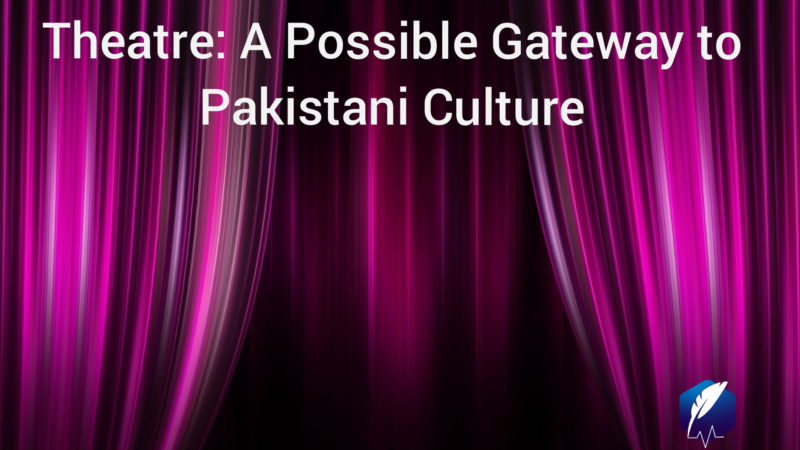Theatre has always been an important cultural phenomenon that integrates social cohesion and representation in the form of performance and acting. It has existed as an important source of entertainment, especially prior to the electronic entertainment era. Even today it is significant as it mirrors the culture of a society. Throughout history, it has been used to represent social change and new ideas to society.

Now coming to the theatre in the Subcontinent, it has surfaced since the 19th century as Urdu theatre. But since the partition, the theatre particularly in Pakistan was not that influential. Today, it still exists but one can hardly call it a representation of our culture.
In comparison, there are many countries around the world that spend a high budget of entertainment in the theatrical industry. Not only that theatrical courses are offered at university levels, hence it is considered a proper degree. Thus, for Pakistan to have a successful theatrical representation, there is a need for theatrical studies at higher land more professional levels. A well set up Theatrical industry can be a means of cultural representation for Pakistan.

What is Theatre?
Theatre dates back to 600 B.C in Greece. It started with the religious festival called ‘Dionysia’ in Athens where they performed different acts of tragedy and comedy based on the Greek mythologies. The word ’Theatre’ originates from the Greek word ‘theatron’ that literally means ‘a place to view’. Greek theatre marks the beginning of the performing entertainment as it expanded gradually with time around the world. As Athens was the center of trade, many visitors from different countries were spectators of the performances during the festivals. With time and technological advancements, the theatre became a cultural phenomenon around the world.
The fascinating fact about Greek theatre is that although it is very old, the plays are still performed today in theatres around the world. The Greek mythologies are a great inspiration for different playwrights.
Also, Greek theatre is studied for research purposes, to learn about the politics, society, and heritage of the Greeks. In fact, a huge part of theatrical studies begins with studying the Greek theatre as the basic foundation of drama. By doing so, a civilization that existed many years ago is still remembered in the form of performing arts, this shows how important it is to study and research in theatre.

Theatrical studies
Theatrical studies are the study of performances and acts in relation to its historical, social, political, and cultural context. The theatre as a study was introduced by a Russian scholar Larisa Ivleva in the 20th century. He came up with a literary theory of theatre based on descriptive anthropology that studies the human cultures to study Russian theatre in terms of folk culture development. Since then, the theatre has evolved with technology and has changed with cultures and time. And understanding those changes has become an essential study for sociologists and anthropologists.
From the plays of Aeschylus to Brecht, there is a long list of dramas that hold so many mysteries in the form of literature and performance that can unleash hidden truths of gone civilizations and modern civilizations.
Furthermore, Theatrical study is an ideal platform for aspiring actors and directors. By reading, analyzing, creating, and performing in theatrical studies as it helps in gaining knowledge pertaining to production, stage management, directing, writing, dramaturgy, technological use on stage, and acting in one course. You can either aspire to perform or create your own stage for the world to see. It is an umbrella discipline of performing arts with so many new opportunities.

Pakistan and Theatre
Pakistan has always been rich with different cultures and traditions. Therefore, there is a need to study theatre. Not only can we trace back our long-lost heritage but also introduce a new form of performing arts with our own creative skills. In the digital world, there is a potential for cultural widespread that can interest people from different parts of the world to explore our culture. Theatre is considered to be the hub of cultural expansion. Through performance, the stage expresses the true identity of the country.
In short, Pakistan’s true heritage can only be recognized by knowing its arts and theatre that existed before and after partition but was forgotten with time. Studying theatre will solve all the mysteries of my own identity and culture.
Although there is a very low scope of theatre in Pakistan, still there is a need to introduce Theatrical studies as a discipline in the universities.
Once this is done, the opportunities for designing theatre and theatre buildings will also increase with time. To go global, Pakistan needs to expand its culture, which can only be achieved through art and performance.
Every country, today, puts emphasis on theatrical studies. Each has theatrical studies as a discipline based on their own literature to find their lost identity. Furthermore, since theatre became a global phenomenon, governments find it a profitable discipline to fund upon in order to globalize their own cultures around the world.
Theatrical studies is not about learning different acts and performance but it is also about knowing the aesthetics and semiotics of theatre in terms of culture and heritage. Theatre is the essential institution of keeping a civilization alive even after it disappears.
Written by: Nimra Javed



